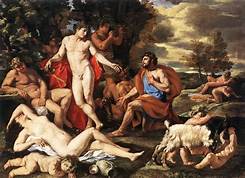The first day of the BACCHANALIA in ancient Rome. Introduced into Rome from lower Italy by way of Etruria (c. 200 BC), the bacchanalia were originally held in secret and only attended by women. The festivals occurred in the grove of Simila near the Aventine Hill on March 16 and March 17. Later, admission to the rites was extended to men, and celebrations took place five times a month. According to Livy, the extension happened in an era when the leader of the Bacchus cult was Paculla Annia — though it is now believed that some men had participated before that. In Empires of Trust: How Rome Built — And America Is Building — A New World by Thomas Madden, the author cites the words of the scandalized contemporary Roman investigative consul in his report to the Roman Senate: “there was no crime, no deed of shame, wanting.
More uncleanness was committed by men with men than with women. Whoever would not submit to defilement, or shrank from violating others, was sacrificed as a victim. To regard nothing as impious or criminal was the sum total of their religion. The men, as though seized with madness and with frenzied distortions of their bodies, shrieked out prophecies; the matrons, dressed as Bacchae, their hair disheveled, rushed down to the Tiber River with burning torches, plunged them into the water, and drew them out again, the flame undiminished because they were made of sulfur mixed with lime.
Men were fastened to a machine and hurried off to hidden caves, and they were said to have been taken away by the gods. These were the men who refused to join their conspiracy or take part in their crimes or submit to their pollution.”
In 1984 Gay philosopher, activist and historian, Arthur Evans directed a production of The Bacchae at the Valencia Rose Cabaret in San Francisco of his own new translation, from the ancient Greek, of Euripides’ play, Bakkhai, dealing with the Greek god Dionysos. In 1988, this translation, together with Evans’ commentary on the historical significance of the play for gay people and women, was published by St. Martin’s Press in New York under the name of The God of Ecstasy [St. Martins Press ISBN-10: 031202214X ISBN-13: 978-0312022143
